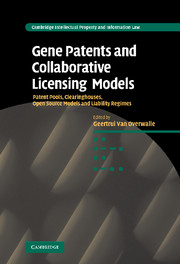 Gene Patents and Collaborative Licensing Models
Gene Patents and Collaborative Licensing Models from Part IV - Liability regimes
Published online by Cambridge University Press: 14 January 2010
Introduction
Most therapeutic interventions produced by pharmaceutical firms take the form of small molecule drugs, which are mass produced at low marginal cost and ingested orally. Drug therapies typically work by affecting the activity of human proteins, known in the industry as targets, that have been implicated in disease pathways. Thus far, medical science has identified safe and effective therapies for only a few hundred of the estimated 3,000 protein targets in the human genome that are potentially susceptible to a drug. Moreover, pharmaceutical firms have encountered major obstacles in producing fundamentally new small molecule drugs, especially those that work against new targets. According to one report, an average of only three drugs that act on novel targets have reached the market annually in recent years.
This highly visible problem has attracted commentary in scholarly articles, government white papers and the popular press. Government agencies, such as the National Institutes of Health, and industry insiders, have also recognized that one of the most serious pitfalls involves the difficulty of moving across the so-called “valley of death” that separates upstream research on promising genes, proteins and biological pathways from downstream drug candidates. For example, an upstream finding that a given protein is differentially expressed in in dividuals with a particular disease may suggest that the protein merits further investigation.
To save this book to your Kindle, first ensure [email protected] is added to your Approved Personal Document E-mail List under your Personal Document Settings on the Manage Your Content and Devices page of your Amazon account. Then enter the ‘name’ part of your Kindle email address below. Find out more about saving to your Kindle.
Note you can select to save to either the @free.kindle.com or @kindle.com variations. ‘@free.kindle.com’ emails are free but can only be saved to your device when it is connected to wi-fi. ‘@kindle.com’ emails can be delivered even when you are not connected to wi-fi, but note that service fees apply.
Find out more about the Kindle Personal Document Service.
To save content items to your account, please confirm that you agree to abide by our usage policies. If this is the first time you use this feature, you will be asked to authorise Cambridge Core to connect with your account. Find out more about saving content to Dropbox.
To save content items to your account, please confirm that you agree to abide by our usage policies. If this is the first time you use this feature, you will be asked to authorise Cambridge Core to connect with your account. Find out more about saving content to Google Drive.